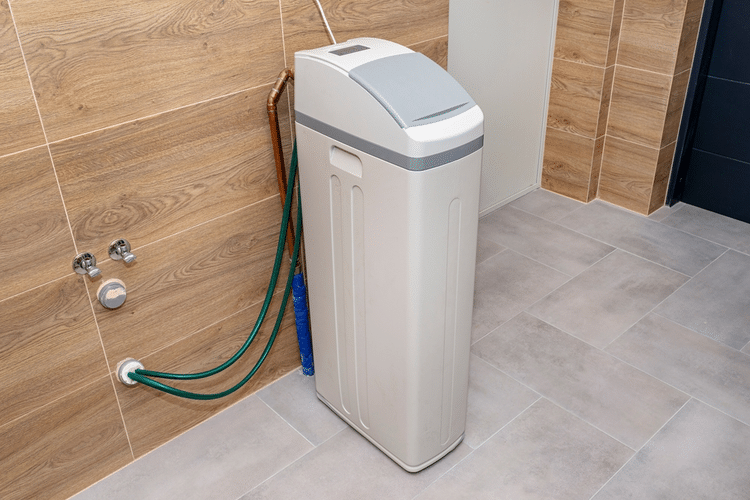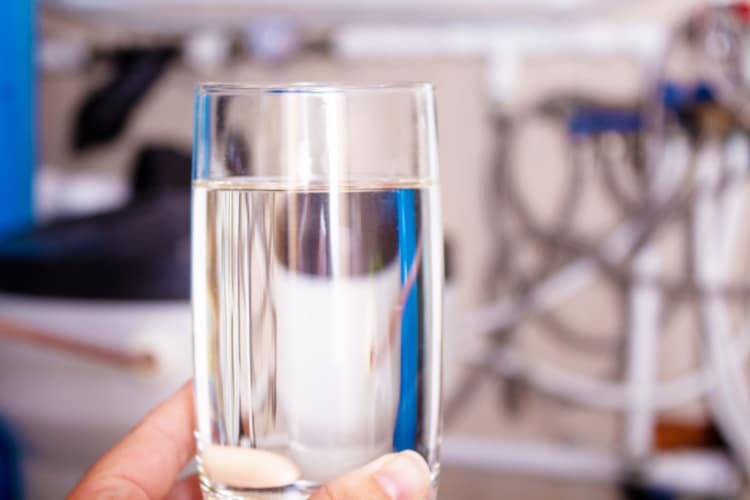Water softeners remove calcium and magnesium minerals through ion-exchange process.
During this process, the negatively charged resin beads in the water softener tank attracts the positively charged calcium or magnesium ions in the water. The positively charged ions are then replaced with sodium or potassium ions from the water softener salt.
These resin beads are continuously recharged by a brine solution that’s produced in the brine tank during regeneration cycles. The brine tank houses the water softener salt, and the sodium (or potassium) ion in the salt plays a significant role in removing the hard water minerals.
In simple terms; what does a water softener remove? Water softeners remove calcium and magnesium ions by replacing them with sodium or potassium ions through an ion-exchange process.

Does a Water Softener Remove Calcium?
Yes, water softeners remove calcium in water by replacing the calcium ion with sodium or potassium ion.
Calcium is one of the minerals that make water hard, and the main cause of limescale buildup in appliances. Traditional water softeners are able to trap calcium ions in their resin beads and replace them with sodium or potassium.
There are also water descaling devices, like the Yarna Capacitive, that neutralizes calcium ions by sending electrical impulses to prevent the ions from bonding.
Does Water Softener Remove Fluoride?
Unfortunately, water softeners do not remove fluoride from water because fluoride is a negatively charged ion. Water softeners only remove positively charged hard water minerals like calcium and magnesium.
The resin beads inside water softeners are negatively charged. This means that they can only attract, trap, and replace positively charged ions. Fluoride, unfortunately, is already a negatively charged mineral which makes the resin beads ineffective against it.
That said, there are ample ways and water filters that can remove fluoride from water. Reverse osmosis systems or whole-house filtration systems are the 2 popular water filters for this purpose.
You can learn more about how to remove fluoride from water by following this link: How to Remove Fluoride From Water: Effective Methods
Does Water Softener Remove Minerals From Drinking Water?
Yes, water softeners can only remove positively charged hard water minerals like calcium and magnesium, and small amounts of iron. They cannot remove negatively charged ions like chlorine and lead.
Calcium and magnesium are minerals that are essential for a healthy diet. Their absence in drinking water can cause health issues like impaired bone growth, especially for infants and children.

So, if you need to use soft water for household chores, we advise you make sure to have a different supply of drinking water.
That said, drinking water isn’t the primary source of nutritious minerals for adults, and in all fairness, it shouldn’t be. If you already have a mineral-rich diet, you can drink as much soft water as you like.
Conclusion
Water softeners attract positively charged mineral ions and either replace them with sodium or potassium or break down the bonds between them. This way, they’re able to remove or neutralize minerals calcium and magnesium minerals that are abundant in hard water.
However, they’re incapable of removing negatively charged minerals. So, if you’re worried about the presence of a negatively charged minerals in your water supply, like fluoride, for example, it’s better to invest in a reverse osmosis system or a whole-house filtration unit.